Anxiety is a common, normal, and often healthy emotion. No matter how natural it is to feel anxiety, it’s quite common to wonder, “Why do I feel uneasy in my relationship?” To feel restless in a relationship can look like constantly questioning yourself, your partner, and the relationship as a whole. A natural concern then would be, “Is it relationship anxiety or I’m not in love?”
In this article, trauma-informed counseling psychologist Anushtha Mishra (MSc., Counseling Psychology), who specializes in providing therapy for concerns such as trauma, relationship issues, depression, anxiety, grief, and loneliness among others, writes to answer these questions along with things you can do to deal with relationship anxiety and understand whether it’s relationship anxiety or gut feeling.
Why Do I Feel Uneasy In My Relationship – 7 Probable Reasons
Table of Contents
Uneasiness is a feeling of anxiety or discomfort. You might have a picture-perfect relationship or are meant to be together and yet feel a sense of discomfort, which might leave you feeling confused. There are many reasons a person might feel anxious in their relationship.
Understanding these reasons can help make us aware of what’s happening within us without overthinking relationship anxiety. This also paves the way to deal with anxiety with more empathy. So let’s dive into the reasons that you might be feeling tied down in a relationship.
1. You are experiencing fear of abandonment
Joanna (pseudonym), around the age of 24 years old, came to me with concerns about anxiety that she has been experiencing in her relationship of 8 months, stating, “I feel uneasy around my boyfriend even though I love him. Isn’t this strange? Why do I feel uneasy in my relationship?” She was concerned that she’s overthinking relationship anxiety. I assured her that’s not true. We reflected on how her fear of abandonment is causing her anxiety, worrying that her partner may leave some day and she’ll be left behind.
Abandonment issues in a relationship or fear of abandonment can seem like walking uphill with a heavy stone on your shoulders. It is when you are anxious that the people you care about might leave you or you may lose them. It can be a very isolating experience and it was for Joanna as well.
Research shows that lack of emotional and physical connection or parental emotional neglect may lead to developing a fear of abandonment. Childhood loss or a traumatic event related to divorce or death in the family can make you fear being abandoned too.
2. Maybe because of your past experiences
Joanna had a tough childhood and relationship history. In a recent relationship, she was ghosted by her partner and had never been given closure after any of her breakups. As she put it herself in one of her sessions, “I have always been made to feel unsettled in my relationship. Feeling uneasy in my relationship, even with a loving partner, has been a norm for me. In my last relationship, it was like I had been left on seen. I was very shaken and now I worry this might happen again.”
Past experiences have made up our life until this point and it’s only natural that they affect every experience we have moving forward. It’s understandable then, that they influence our thoughts, beliefs, and how we see the world and navigate our relationships.
These experiences can include, but are not limited to, having had a tumultuous or an abusive relationship. Parental loss, child abuse and neglect, and a chaotic home environment are a few other factors that can cause feelings of uneasiness in a relationship.
Related Reading: 12 Signs Your Past Relationships Are Affecting Your Present Relationship
3. Depends on the attachment style formed in your childhood
“Why do I feel uneasy in my relationship?” It may be because of the attachment style you formed in your childhood. The way we attach ourselves to other adults has its roots in how we were attached to our primary caregivers in our childhood. As a child, it’s important to feel safe and secure, however, when that sense of safety is missing, it leads to the child forming anxious or insecure attachment styles.
Attachment styles dictate how we perceive and deal with closeness and emotional intimacy, our ability to communicate our needs, and the ways we respond to conflicts. Anxious or insecure attachment style is usually seen in individuals who feel restless in a relationship.
Joanna shared, “I was very young when my parents got separated and that left me feeling insecure at an early age. I’ve been uneasy around my boyfriend though I can’t seem to pinpoint a reason for it. Can my childhood be one of the reasons for it?” This made us discover her attachment style, which had a part to play in the anxiety she felt in her relationship.
4. You have a fear of commitment
Fear of commitment is when you are scared of getting close to or serious about someone. This can keep you from enjoying meaningful relationships and may make you ponder, “Why do I feel uneasy in my relationship? Is it relationship anxiety or I’m not in love with my partner?” The most prominent reason for feeling this way is when you have commitment issues where you keep questioning the relationship even when you’re happy in it.
This again has its roots in your past experiences such as a painful breakup, witnessing a difficult relationship between your parents, divorce, or abandonment during childhood or adulthood. The core fear is that of getting hurt. This is a very real fear and has consequences for both the partners in a relationship and often leads to feelings of uneasiness.
5. You are afraid of rejections
All of us dread rejections, especially in relationships. It is one of the deepest fears in a relationship a person has. If you are thinking, “Why do I feel uneasy in my relationship?”, it might be due to a fear of rejection. It also stems from a deeper fear of being left alone, hurt, and in pain.
This can keep us from experiencing intimate connections and leave us feeling tied down in a relationship. We tend to withdraw from people rather than risk reaching out and getting rejected. This also holds us back from expressing our authentic feelings.
Fear of rejection also gives rise to feeling uneasy in relationships in general, especially romantic relationships. It often leads to the constant worry that your partner will reject you, and you’d be left isolated and wounded.
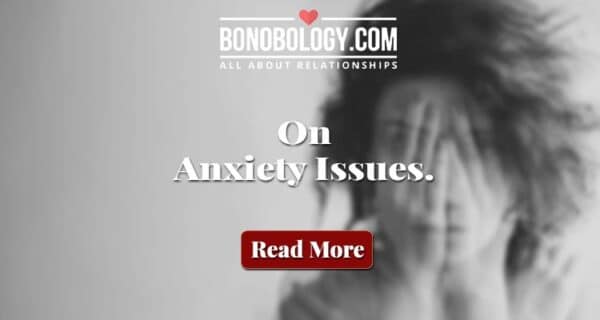
6. You have a low self-esteem
Self-esteem is made up of our sense of self and the opinions we carry about ourselves. It impacts how we feel about ourselves. Low self-esteem brings out our deeper insecurities and worries, which eventually lead to uneasiness or anxiety in relationships. This answers the long-pressing question: Why do I feel uneasy in my relationship?
Joanna, due to her fear of abandonment and rough past experiences, also experienced signs of low self-esteem where she couldn’t accept that someone could like or love her. She couldn’t differentiate between relationship anxiety or gut feeling. This constantly made her doubt her relationship, which was also one of the huge sources of her relationship anxiety.
7. There’s history of an anxiety disorder
Anxiety is a very normal and common emotion we experience and some amounts of it are bound to happen in a human’s life. However, anxiety disorder is a constant overwhelming sense of worry and fear.
If an individual already has any of the anxiety disorders, the chances that the anxiety can show up in relationships are high. It’s like a breeding ground for anxiety. Already-present anxiety gives way to more anxiety unless there’s timely intervention where you explore ways to deal with it.
Related Reading: Coping With A Boyfriend Who Gives You Anxiety Attacks – 8 Helpful Tips
3 Things You Can Do If You Have Relationship Anxiety
Being the one wondering “Why do I feel uneasy in my relationship?” or having a partner with relationship anxiety can be overwhelming and hard to deal with. The experience might be daunting or you may feel as if the relationship is bound to end due to anxiety-driven thoughts. But it doesn’t have to take that route.
There are different ways you can cope with, process, and deal with the relationship anxiety that you or your partner might be feeling. Awareness of the anxiety is the first step toward healing from it and below are three tips on how you can navigate this difficult experience.
1. Accept how you feel
It’s important to embrace and process painful or hard emotions to be able to navigate them. Only once you accept that you are feeling a certain way and by practicing emotional attunement can you do something about it. Acceptance is difficult and can be overwhelming due to the judgments that we mete out to ourselves, but it is also liberating. It liberates you from the internal query: Why do I feel uneasy in my relationship?
Get a ‘feelings wheel’, and identify what you are feeling when you are feeling it. Be it anger, embarrassment, sadness, helplessness, or guilt. Once you are aware of what’s surfacing for you, accept it without being critical of it.
Acceptance paves the way for the process of healing. One study showed that accepting emotions is highly linked with mental well-being and satisfaction. Individuals who accept rather than judge their mental experiences may attain better psychological health, in part because acceptance helps them experience less negative emotion in response to stressors. This takes a lot of effort, so reaching out for support can help you through this.
2. Communicate with your partner
I can’t stress enough how important communication is in a relationship, be it platonic or romantic. If you find yourself asking, “Why do I feel uneasy in my relationship?”, try communicating your feelings of anxiety with your partner, communicate how you question yourself and the relationship, and how you want them to support you.
Honest conversations always strengthen the relationship. They also strengthen the foundations of the relationship and help you discover different aspects of your relationship together. It’s completely alright if you don’t know everything before you initiate a conversation. It’s okay to take one thing at a time. If the conversation gets overwhelming, take a time-out but do make it a point to address the anxiety that you or your partner might be feeling.
Related Reading: 11 Expert Tips To Communicate Better With Your Partner
3. Seek support
Seeking support from your friends, family, and mental health professionals can help you feel more empowered and let go of the “feeling uneasy in my relationship” worry. It is one of the greatest signs of strength – asking for the help you need.
In fact, one of the many researches done on recovering from anxiety shows that individuals who had at least one person in their lives, who provided them with a sense of emotional security and well-being, were three times more likely to be in excellent mental health.
Lean on your support system. If it gets overwhelming, it’s always a good idea to seek support from a mental health professional. MHPs are trained to take you through this journey of uneasiness and help you get to the other side.
When Joanna reached out to me, stating, “I don’t know why I feel unsettled in my relationship”, she was unaware of what was making her feel the anxiety and overall sense of uneasiness in her relationship. With therapy, her needs were understood, she felt supported, and, most of all, it helped her normalize her own experience.
Key Pointers
- Anxiety is a common, normal, and often healthy emotion
- Reasons you feel uneasy in your relationship can be innate fears of abandonment, commitment, or rejection
- Low self-esteem, rough past experiences, and our attachment styles also play a role
- The experience of relationship anxiety might be daunting but there are different ways you can cope with and process the anxiety
- Accepting your feelings, communicating how you are feeling, and taking support are a few ways you can deal with relationship anxiety
Relationships have unconditional love and are beautiful but they also can be shaky, leaving you wondering, “Why do I feel uneasy in my relationship?” They can bring out your deepest fears and insecurities. They can be like a mirror ball, showing you every version of yourself. You discover yourself and your partner as a whole.
Of course, it’s scary and that can make anyone anxious but it’s important to understand that it’s normal. You don’t have to take giant steps at once or climb the ladder in one go. It is okay to take baby steps or put on training wheels till you and your partner are in a place where both of you can let go of the anxiety.
FAQs
It is completely normal to feel so and, in fact, very common, especially new relationship anxiety. Of course, you have tons of thoughts about how this will all work out and where everything is headed.
As normal as it is, it still can be overwhelming. Do reach out to your partner, family, friends, or a mental health professional and take all the support that they can offer you. You don’t have to navigate the anxiety all by yourself.
It can feel like clutter in your mind or like a train rushing through the tracks in your head with feelings of inadequacy, anger, helplessness, or oblivion. Almost like you’re stuck in limbo with no answers (even when you do have them).
Emotions such as anxiety are not inherently bad. They are cues to what’s happening with us. Acknowledging and accepting them without judgment can help us respond to these emotions and steer through them.
The first step is always accepting that you are feeling anxious, which means that you don’t judge yourself for it. It also includes being kind and compassionate toward yourself, just like you would be to your loved ones.
Communicating your anxiety to your partner is also important. As I mentioned before, you don’t need to have everything figured out before you initiate the conversation. Both of you can help ease each other and discover more about yourselves and the relationship in the process.
Separation Anxiety In Relationships – What Is It And How To Cope?
Your contribution does not constitute a charitable donation. It will allow Bonobology to continue bringing you new and up-to-date information in our pursuit of helping anyone in the world to learn how to do anything.

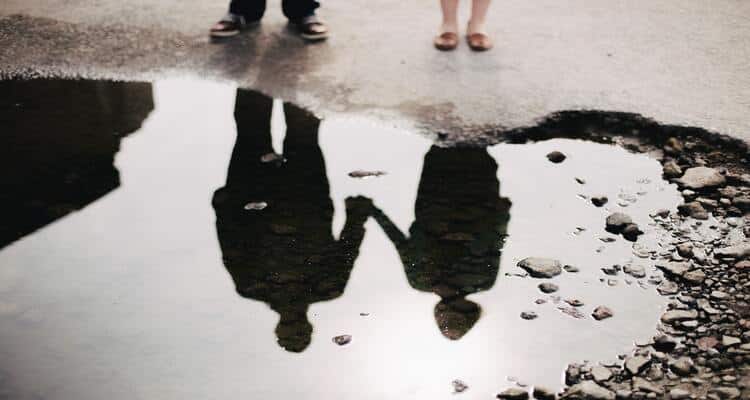

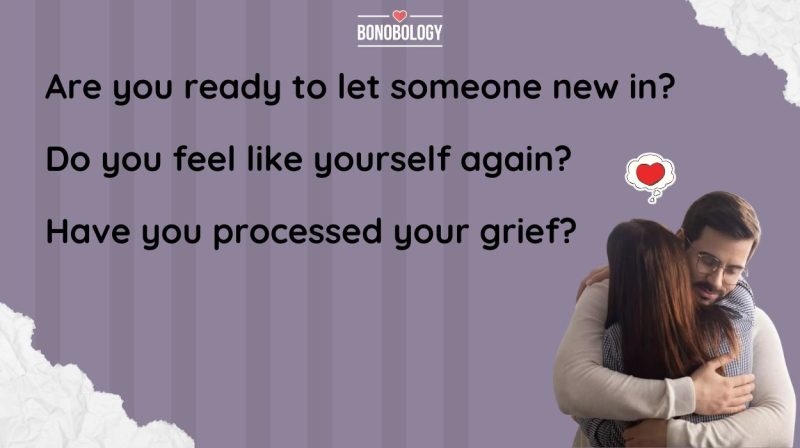
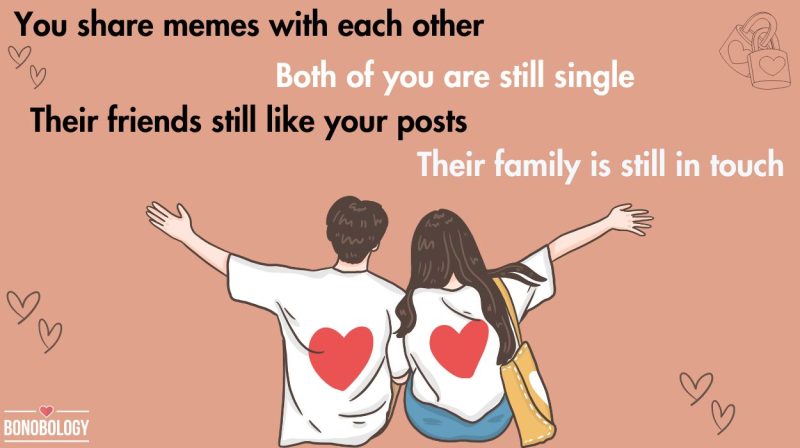














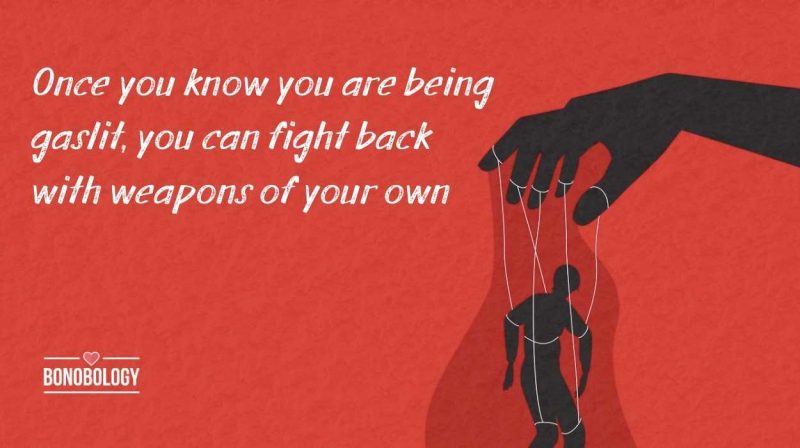
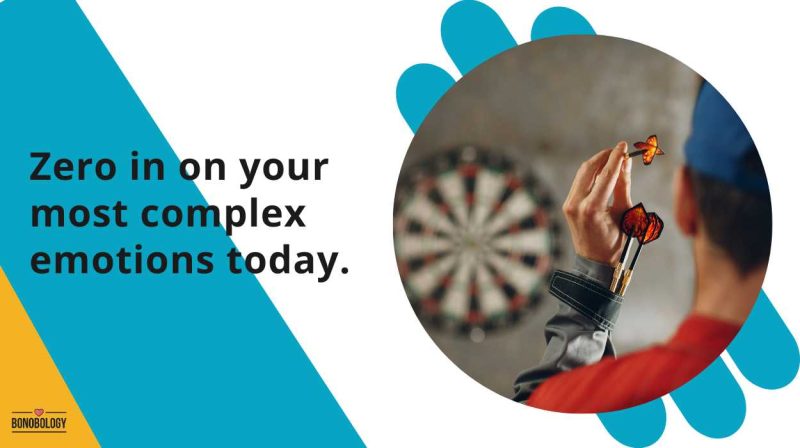
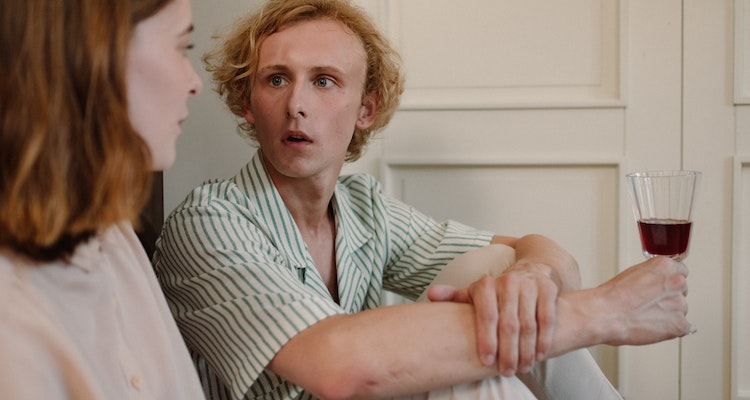

Featured
Am I Moving On Too Quickly After Death Of Spouse—How To Decide
15 Signs You’ll Get Back Together With Your Ex
How To Get Over Trust Issues — A Therapist Shares 9 Tips
Learn How To Forgive Yourself For Hurting Someone You Love
How To Find Peace After Being Cheated On — 9 Tips From A Therapist
How To Forgive A Cheating Husband: 15 Helpful Tips
35 Disturbing Signs Of Gaslighting In A Relationship
What Is Narcissistic Ghosting And How To Respond To It
‘My Husband Starts Fights And Then Blames Me’: Ways To Cope
How To Rebuild Your Life After The Death Of A Spouse: 11 Expert-Backed Tips
My Husband Died And I Want Him Back: Coping With Grief
“Am I Unlovable” – 9 Reasons You Feel This Way
11 Signs Your Girlfriend Was Sexually Abused In The Past And How To Help Her
Coping With Breakups: The Must-Have Breakup Apps For Your Phone
15 Signs You Are Wasting Your Time Trying To Get Your Ex Back
Why Are You Obsessed With Someone You Barely Know — 10 Possible Reasons
33 Phrases To Shut Down Gaslighting And Silence Gaslighters
The Emotion Wheel: What It Is And How To Use It To Build Better Relationships
The Role Of Supportive Relationships In Addiction Recovery
7 Signs You Have A Verbally Abusive Wife And 6 Things You Can Do About It